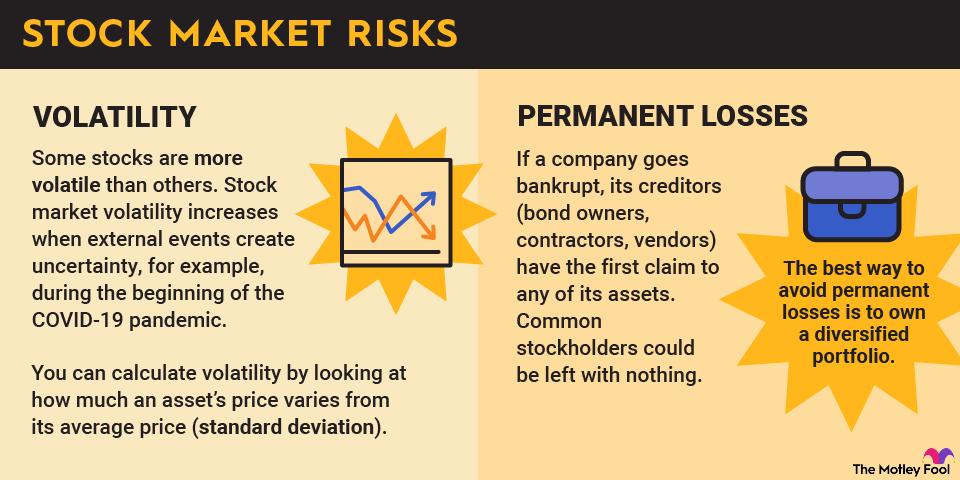A wisely crafted investment portfolio can build tremendous wealth over time. Investing money the right way can help send your kids to college, plan for a comfortable retirement, or meet any other financial goals.

It's common knowledge that investing is a smart idea. However, there's also the important question of what you should invest in. In this article, we're going to take a closer look at some of the most popular investment vehicles.
To clarify, we will not be discussing specific investment ideas here. If that's what you're looking for, we have tons of great content, such as our list of some top stocks to buy right now.
Even though we aren't getting into specifics, the type of investments to choose from is still a very important discussion. We'll also examine some investments you may want to avoid. As many experienced investors can tell you, avoiding mistakes can be just as important as finding great investments.
Why investing matters
Investing is important for a few key reasons:
- Investing can help you build a retirement nest egg.
- Investing can help you beat inflation over time.
- Investing can help you prepare for major life goals, like sending your kids to college.
- Investing can have tax advantages, especially for long-term investments.
- Investing can allow you to create an income stream from your money.
This is not an exhaustive list. However, the key point is that there are numerous compelling reasons to begin investing money today.
High-potential investment options in 2026
One of the primary reasons people don't invest is that they are unsure of what to invest in or how to get started. Here are some of the most common ways to invest your money.
1. Stocks
Let's be perfectly clear. Almost everyone should own stocks or stock-based investments, such as exchange-traded funds (ETFs) and mutual funds (more on those later).
If you have a 401(k) or similar retirement plan at work, you probably already have money in the stock market. There's a good reason for this. Stocks have consistently proven to be the best way for the average person to build wealth over the long term.
Stock
Stocks have outperformed most investment classes over almost every 10-year period in the past century.
The S&P 500 benchmark index has historically averaged annual returns of 9% to 10%, depending on the exact time interval being viewed. To put returns like this into perspective, a $10,000 investment compounded at 10% for 30 years would grow to almost $175,000.
As legendary investor Warren Buffett puts it, investing in U.S. stocks is a bet on American business. This has been an excellent bet for more than two centuries.
Dividend Income
2. Exchange-traded funds (ETFs)
If researching and selecting individual stocks doesn't sound like your thing, that's perfectly fine.
An alternative is to invest (either exclusively or partially) in exchange-traded funds, or ETFs. The basic idea is that ETFs trade on major exchanges just like stocks, and your money will be invested to achieve a stated objective.
For example, if you invest in an S&P 500 index fund, your money will be spread out among the 500 companies that make up the index. The value of your investment should track the performance of the index over time.
3. Mutual funds
Mutual funds are similar to ETFs. They pool investors' money and use it to accumulate a portfolio of stocks or other investments.
The biggest difference is that ETFs trade on major stock exchanges, and you can buy shares whenever the stock market is open. Mutual funds price their shares only once a day and aren't nearly as liquid.
4. Bonds
Over the long term, accumulating wealth is the primary focus. But once you've built that wealth and are closer to retirement age, bonds -- which are loans to a company or government -- can help you stay wealthy. There are three main kinds of bonds:
- Corporate bonds issued by companies
- Municipal bonds issued by state and local governments
- Treasury notes, bonds, and bills issued by the U.S. government
For most investors, the best way to go is to buy ETFs and mutual funds that invest in bonds on your behalf.
The main goals of investing in bonds, as opposed to stocks, are capital preservation (preventing yourself from losing money) and income generation.
5. High-yield savings accounts
Savings accounts offered by branch-based banks are notorious for paying minuscule interest rates.
On the other hand, some excellent banks, primarily based online, offer very competitive rates -- to the point that they can be considered investment-worthy in many cases. As of January 2026, savings account interest rates in the 3.5% ballpark (or higher) were still readily available if you do a little research.
6. Certificates of deposit (CDs)
Many reputable banks offer excellent high-yield certificates of deposit (CDs). These pay guaranteed yields for anywhere from a few months to five years or more.
Unlike savings accounts, CDs allow you to lock in a specific yield for a set period. This can be an especially valuable feature when interest rates are relatively high, and you want predictable returns.
The Federal Deposit Insurance Corp. (FDIC) insures CDs and savings accounts up to $250,000 per person per bank to protect you against bank failure.
7. Real estate
Like owning great companies, owning real estate can be a wonderful way to build wealth. In most recessionary periods throughout history, commercial real estate has performed rather well. It's often viewed as a safer, more stable investment than stocks.
There are ways for people at almost every financial level to invest in and make money from real estate. The most obvious option is to buy a rental property, which can be a great way to build wealth and create a steady income stream. However, this isn't the best fit for everyone.
Fortunately, there are alternative ways to invest in real estate. Many, such as real estate investment trusts (REITs), are much more passive than actually becoming a landlord.
Passive Income
Publicly traded REITs are the most accessible way to invest in real estate. REITs trade on stock exchanges just like other public companies. REITs can be especially great for income since they are required to pay out at least 90% of taxable income as dividends.
8. Cryptocurrencies
Cryptocurrencies are a relatively new form of investment vehicle. Popular examples include Bitcoin (BTC -3.33%) and Ethereum (ETH -4.59%).
If you have knowledge about cryptocurrencies, you can incorporate them into a diversified investment portfolio.
9. Treasury securities
If you're investing for income and want as little risk as possible while still maintaining liquidity, Treasury securities can be a great alternative to CDs or corporate bonds.
Treasury securities can be easily bought and sold. You can do so through your brokerage, or you can open an account with Treasury Direct and transact directly with the U.S. government.
Treasury securities (often referred to simply as "Treasuries") have maturity terms ranging from one month to 30 years, and yields change constantly based on market conditions. As of January 2026, Treasury yields ranged from about 3.45% to 4.9% (annually), depending on the maturity term of the particular Treasury security. However, if you buy a Treasury and want to cash out before it reaches maturity, there's usually a highly liquid market for them.
Best sectors for investment opportunities
Of course, the best places to invest can vary, depending on your personal investment goals and risk tolerance. However, to give you some ideas, here are some of the top sectors to consider investing in as we head into 2026.
- Technology - Technology is where some of the most exciting investment opportunities live. You're probably well aware of the boom in artificial intelligence (AI) in recent years, and there are other tech trends, such as autonomous vehicles, Internet of Things (IoT), and cybersecurity, that have tons of interesting opportunities.
- Financials - Although it's not as exciting as technology, the financial sector could be a great opportunity, especially as interest rates decline. Not only would lower interest rates reduce deposit costs, but they would likely increase demand for loans.
- Energy and industrials - Global energy demand is rising faster than many had expected, fueled by the massive power demand of AI infrastructure (data centers). Investing in businesses that help meet these energy challenges in sustainable ways can be a smart strategy.
Factors to consider
No investment approach works for everyone. So, to figure out the best way for you to invest your hard-earned money, here are some things to think about:
Your risk tolerance
Stocks are not risk-free investments by any definition. Even the most stable companies' stocks can fluctuate dramatically over short periods. Over the past 50 years, the S&P 500 has declined by as much as 37% in a single year and has risen by as much as 38%.
On the other hand, bonds and other fixed-income investments have less long-term return potential than stocks. However, they compensate for this with steady income generation and minimal volatility.
Stock Market Volatility
Time horizon
If you have a kid heading off to college in a year or two, or if you're retiring in a few years, your goal should no longer be maximizing growth. It should be protecting your capital.
It's a good idea to shift the money you'll need in the next several years from stocks into bonds and cash. This concept is known as asset allocation, and determining the appropriate mix is a crucial part of investing.
Investment amount
With $100 to invest, you can certainly get started. However, your approach will likely be significantly different and your options somewhat limited compared to an investor with $100,000 available.
For example, if you want to buy a rental property, you'll probably need enough money to make a down payment. If you want to invest in a high-yield CD, some of the best options have minimum deposit requirements.
Knowledge level
Investing in individual stocks can be a great way to build wealth -- if you have the time and knowledge to do it right. If you don't, there's absolutely nothing wrong with investing in ETFs or mutual funds to get hands-off exposure to the stock market.
What type of investment account should you use?
Owning the right investments will help you reach your financial goals. But where you invest can be just as important. Many people, especially new investors, overlook the tax implications of their investments, which can leave them falling short of their financial goals.
Simply put, a little tax planning can go a long way. Here are some examples of different kinds of accounts you may want to use on your investing journey:
Investing Account Type | Account Features | Need to Know |
|---|---|---|
401(k) | Pre-tax contributions reduce taxes today. Potential employer-matching contributions. | Distributions in retirement are taxed as regular income. Penalties for early withdrawal. A $24,500 employee contribution limit in 2026. |
SEP IRA/Solo 401(k) | Pre-tax contributions reduce taxes today. Higher contribution limits than IRAs. | Distributions in retirement are taxed as regular income. Penalties for early withdrawal. A $72,000 total contribution limit in 2026. |
Traditional IRA | Ability to roll over 401(k) from former employers. Contribute retirement savings above 401(k) contributions. | Distributions in retirement are taxed as regular income. Penalties for early withdrawal. A $7,500 contribution limit in 2026. |
Roth IRA | Distributions are tax-free in retirement, and withdraw contributions are penalty-free. | Contributions are not pre-tax. Penalties for early withdrawal of gains. A $7,500 contribution limit in 2026. |
Taxable Brokerage | Contribute any amount to your account without tax consequences (or benefits). Withdraw money at any time. | Taxes are based on realized events (even if you don't withdraw proceeds). In other words, you may owe taxes on realized capital gains, dividends, and taxable distributions. |
Coverdell Education Savings Account | More control over investment choices. Withdrawals for qualified education expenses are tax-free. | A $2,000 annual contribution limit; further limits based on income. Taxes and penalties for nonqualified withdrawals. |
529 College Savings | Withdrawals allowed for qualified education expenses. Very high contribution limits. | More complicated and varies by state. Very high contribution limits, but fewer investment choices. Taxes and penalties for nonqualified withdrawals. |
The biggest takeaway here is that you should choose the appropriate kind of account based on why you're investing. For instance:
- 401(k): for employed retirement savers.
- SEP IRA/Solo 401(k): for self-employed retirement savers.
- Traditional IRA: for retirement savers.
- Roth IRA: for retirement savers.
- Taxable brokerage: for savers with additional cash to invest beyond retirement/college savings account needs or limits.
- Coverdell Education Savings Account: for college savers.
- 529 College Savings: for college savers.
Related investing topics
So, what should I invest in?
To be perfectly clear, every investor is different, and no one pathway works for everyone. However, the best answer for most people is a portfolio that combines stocks (or stock-based ETFs and mutual funds) with fixed-income investments, such as bonds and CDs.
One popular asset allocation guideline that financial planners use, known as the Rule of 110, is to subtract your age from 110 to determine the approximate percentage of your portfolio that should be in stocks. For example, according to this rule, a 40-year-old should have roughly 70% of their money invested in stocks and stock-based funds.



